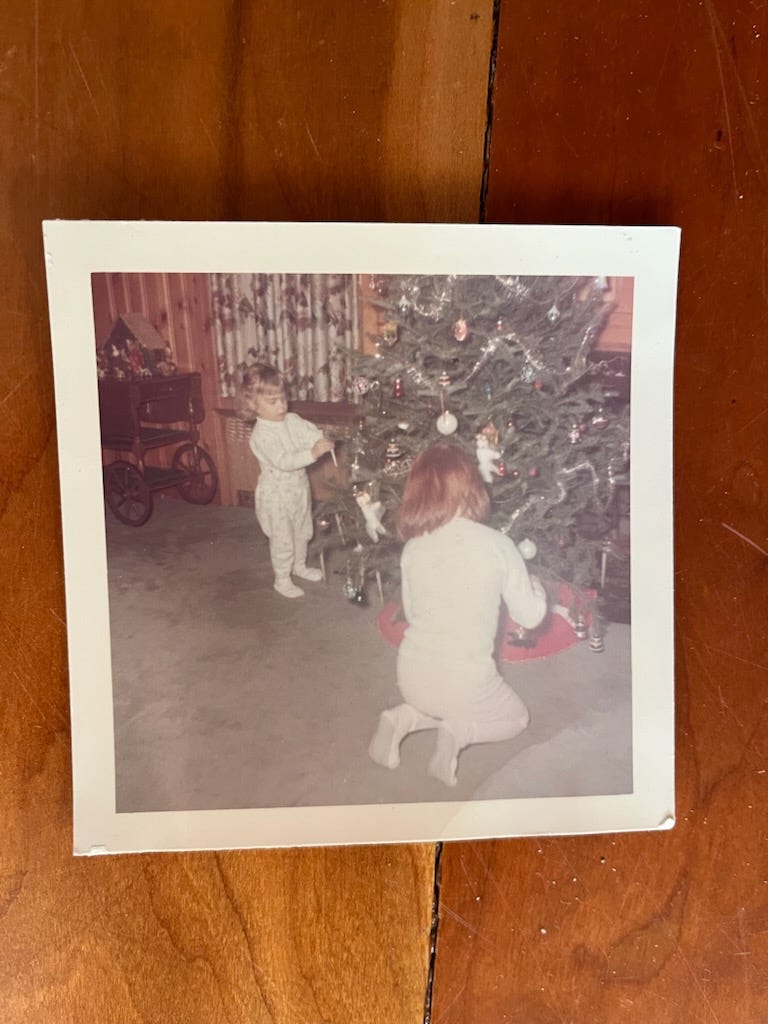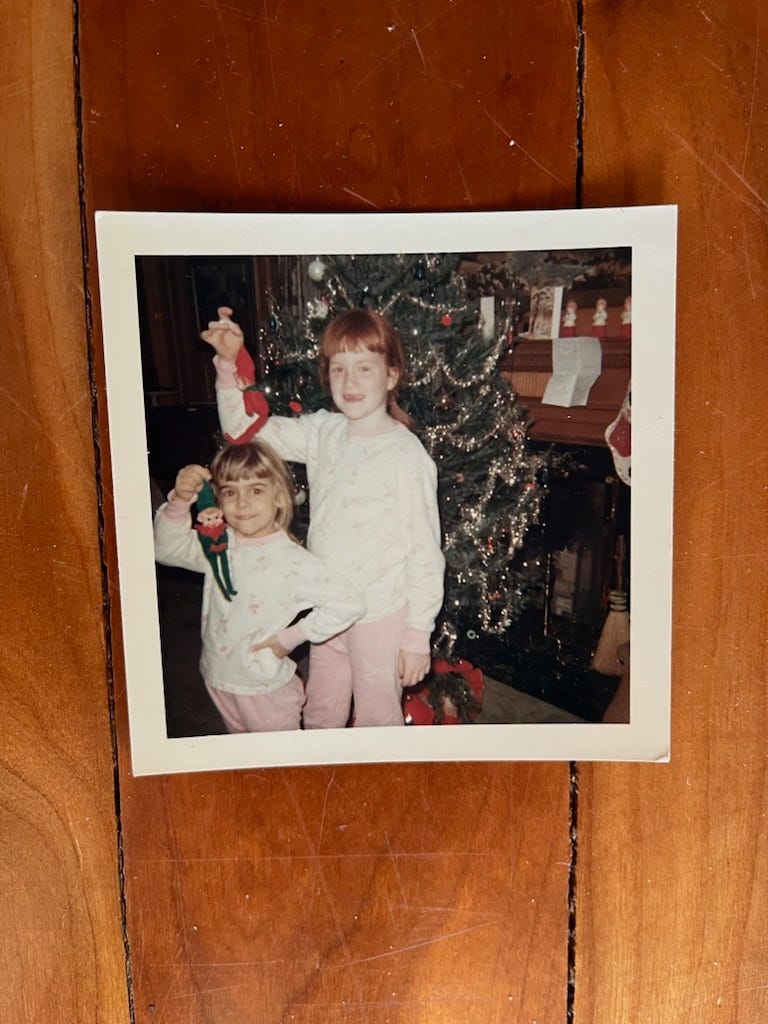I don’t know what to write.
I still don’t feel like writing.
The truth is I hate this time of year. I was never one to immerse myself in holiday frivolity, and as someone who’s never really worked in an office or other workspace, I have never had to endure the forced cheer of endless rounds of Secret Santa, let alone placing bets on who’s going to end up facefirst in the holiday punch at this year’s office party.
And I know exactly where it comes from.
My father died in December 1974, two weeks after Thanksgiving and three weeks before Christmas. I had just turned twelve years old. I’ve always felt like I’m stuck at that age, for better or worse.
I think that everyone has at least one tragedy anniversary, whether or not they’re aware of it….and if they are aware of it, they may block it out completely. A particular time of year or season may make them feel just a bit off, something they might attribute to seasonal allergies, a change of season, or the weather.
Yesterday, on December 26th, I woke up feeling a thousand times better. Because the way that other people and the culture-at-large focus on Christmas like it’s their be-all and end-all, thickening the air with their unrealistic expectations and often-false cheer, just stirs up everything that makes me squirm.
And now it’s faded into the background and I can return to the business of living and writing.
Since I haven’t felt like working on my memoir for almost two months, I’ll post something I wrote earlier this fall in an attempt to understand my squirminess around the holiday, at least a little.
»»»»»»»»»»
The Last Christmas
Bam Bam Bam!
My door sounds like it’s splintering.
I squint at the faded glow-in-the-dark hands of my Westclox.
Twenty minutes after four.
In the morning.
Merry Christmas.
More banging. Bamm Bamm from The Flintstones pops into my head. Never my favorite character.
Neither is Fred, for that matter.
“Get up!” my sister yells. “It’s Christmas!”
I kick off the chenille bedspread, its nubs all twisted out of shape.
“Okay.” My voice is only a whisper, but Jane’s frenzied knocking stops. She stomps down the hall in retreat.
Might as well get this over with.
Downstairs, the living room is lit up like high noon. The tree looks like it’s on fire.
The setting is just like most of the other houses on the street in that perfectly coiffed upper-middle-class suburban neighborhood: A pile of wrapped presents clumped beneath the tree, a few stray strands of tinsel hanging haphazardly from the cat batting it around. Outside, a balsam wreath on the door greets no one but the mailman while twinkle lights curlicue around the dogwood tree.
Two stockings are thumbtacked to the mantel, the telltale boxy bulge of a Droste chocolate “orange” in each stocking, white chocolate for Jane for her allergies, milk chocolate for me.
They were personalized ten years earlier, Jane and Lisa scripted in a thin line of Elmer’s glue, doused with glitter. Sections of the N and L have gone missing, like an errant dot-matrix printer.
Or our lives.
There are fewer presents than the year before, and the labels that mark each package are attached with plain Scotch tape, not the fancy kind with bells and candy canes like before. Last year, the cards read From Santa, From Mom, From Dad. This year there’s no such pretense, only Jane or Lisa in my mother’s tight cursive.
And, of course, nothing for Lou from Jean or vice versa.
My mother usually hung the glass ornaments and we filled in the rest, but this year once she’d dragged the tree through the front door and propped it up in the stand, she retreated back to the den. The smell of pine didn’t even have a chance to fill the air when Jane came flying down the stairs and attacked the tree while I hid in my room.
As usual.
I surfaced a half-hour later when I heard her bedroom door slam on the opposite side of the hallway. She had splattered the front of the tree with her childhood creations – Santas made from spools, felt reindeer, and popsicle-stick angels – while banishing my ornaments to the back. My cotton-ball snowman was missing an eye and flattened on one side, and I wondered if Jane had sat on it just like she’d sat on me with a pillow over my face that one time.
I kept my Frosty where he was, facing the street. Towards escape.
With the divorce pending, we all knew that this was our last Christmas together, though we wouldn’t know how true that really was until one short year later when our ranks would be permanently reduced by one.
It’s no surprise that my parents wanted to get it over as quickly as possible.
Maybe Jane did too, which is why she started in so early.
At 4:25 a.m., we are assembled in the living room for the main event.
My parents stand like they’re in a boxing ring, waiting for a bell that will never sound. On one side, my father’s knuckles are bone-white as they clutch his mug of Sanka. On the opposite side, my mother leans against the built-in bookcase stacked with rows of Readers Digest Condensed Books, their spines uncracked. Two plaster busts of a boy and girl perch on the mantel above the blocked fireplace. I kissed the boy a few times to see what all the fuss was about, but the only thing I noticed was the dust on his lips.
My sister and I kneel by the tree, our usual custom. But my mother has no camera in her hands. No one will want to remember this day. Jane dives into her stack of presents, ripping the paper off two boxes at once, creating a tsunami of paper.
I pick up a rectangular box and delicately pull up one of the taped ends. The box is from Mandees, a local boutique. It’s a long-sleeve rayon blouse with a brown vest attached to it. A few months later, after the vest started to pill, I would take my mother’s seam ripper to detach it, but discovered that it was glued in instead.
Thanks, I say, nodding at both my parents, still on opposite sides of the ring.
It's the first time in years that all four of us are together in the same room doing something together.
When my mother filed for divorce four years earlier, she turned the den into her solitary retreat, drawing an invisible line across the threshold like an old Brady Bunch episode that none of us ever were to cross. Yet I still imagined that maybe one day we could all go to Palisades Amusement Park together like the Abrams next door, or to Maine for a week, like the Zolpers on our other side.
But that Christmas morning, I realized how foolish I was to want the four of us to do anything together again.
When I pick up my second present, my sister stands up. She’s finished unwrapping her presents, though she barely opened the boxes. She heads into the kitchen to pour herself a bowl of Quisp, her usual breakfast of tiny flying saucers. I preferred Quake, Quisp’s rival, with hard crunchy nuggets that put up a fight, but in 1972 Quaker Oats decided to discontinue one of the cereals and held a contest where kids could vote for their favorite, which would continue to appear in the cereal aisle.
I lost. No more Quake.
I open the rest of my presents quickly – though not as fast as Jane – so my parents don’t have to spend another second longer in the same room together.
They’re both still rooted in place, fists clenched, looks of disappointment etched even deeper into their faces. Today, I imagine it was difficult for them to be in that room together on that cold dark morning, both of them wondering how it had come to this point after 25 years of marriage, each torn ribbon and scrap of wrapping paper imprinting deeper their mutual resentment and buried rage and disappointment, perfuming the air so heavily that the smell of balsam completely disappeared.
I stand up and thank them both. They immediately retreat: he goes upstairs to his single bed while she burrows back into her den.
When Jane comes out of the kitchen, a stray bit of Quisp on her cheek, I head upstairs without a word.
That year, Christmas lasts all of 10 minutes. We’re back in our respective corners by 4:35.
««««««««««
Just as I feel significantly better the day after Christmas after a long month of churning, I felt better after writing The Last Christmas. I don’t think I understood my great abhorrence of the holiday any better — and it probably won’t make next December any easier for me — but at least it aired something out, and for me that is the great physical and psychic power of writing about people and events you’ve long blocked out even though you may only have a few details to go on.
And then, of course, another great gush of air comes when you share it with others. So thank you very much for reading.
The Takeaway: While working on your family history or memoir, you may discover [or already know] that you or one of your relatives reacts in a totally off-the-charts way at a particular time of year. While the cause could be one event or a string of smaller slights — or something completely hidden — try writing a scene that really captures their overreaction, as well as touching on the cause. Include the five senses in your writing so that readers can squarely put themselves in your shoes. One of those small sensory memories might just spark something new in your understanding of this person, or yourself.






I can identify with this. My father died two days before Christmas. The holiday was forever changed. Thanks for your story. Thanks for your writing.
I felt so much tension in those ten minutes on Christmas morning and it pulled me in to want to know more. You mentioned your parents were married 25 years before they divorced and that made me realize your parents must have been older parents. And I wanted to know what it was like to have your mother taking up a separate residence for 4 years inside your own home while you were a kid. I get why you dread this holiday.